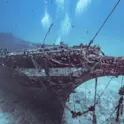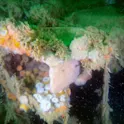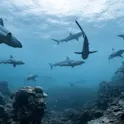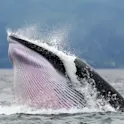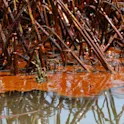
Featured news
06 Feb 2023
‘Many kids go through a phase where they want to be a marine scientist. For me, it wasn’t a phase’
by Patricia Albano/Angharad Brewer Gillham, Frontiers science writer Patricia stands with remotely operated vehicle Deep Discoverer aboard NOAA Ship Okeanos Explorer during an expedition to explore the deep waters off the West Florida Shelf. Image: Patricia Albano. Marine protected areas are meant to give threatened species space to live and thrive. But in a recent paper in Frontiers in Marine Science, Patricia Albano and colleagues showed that at least one protective area isn’t capturing the range that endangered sharks use as they grow, leaving them vulnerable to commercial fishing. Albano, now the Internship Program Coordinator at the National Marine Sanctuary Foundation, NOAA Ocean Exploration, caught up with Frontiers to tell us a little about her career and her research, as part of our Frontiers Scientist series. Albano’s work focuses on shark ecology in an anthropogenic world and the associated conservation implications. After a BA and MSc from the University of Miami, she joined a project evaluating the efficacy of the De Hoop marine protected area (MPA) for threatened and endemic sharks off South Africa. Albano also dedicates her time to working in ocean education, supporting workforce development programs and efforts to increase diversity, equity, inclusion, and accessibility. In 2020, she […]


